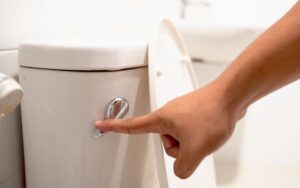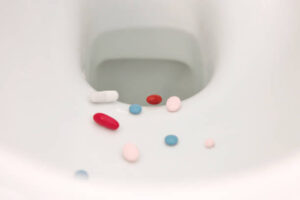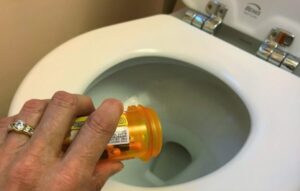In the modern home, the question often arises: Can I flush pills down the toilet? It's a seemingly simple solution to the problem of unwanted or expired medication cluttering up our medicine cabinets.
But is it safe? This article will explore the ramifications of flushing pills down the toilet and why alternative disposal methods are recommended. Stay tuned as we dive into the environmental and health impacts of this common practice and provide practical tips for responsible medication disposal.
Can I Flush Pills Down the Toilet? – Debunking Common Myths
 Many of us, while sorting through expired or unnecessary medication, have paused and wondered: Can I flush pills down the toilet? It's a question that seemingly hovers in the back of our minds, prodded by the convenience of simply dropping those pills into the whirlpool of our toilets and watching them disappear.
Many of us, while sorting through expired or unnecessary medication, have paused and wondered: Can I flush pills down the toilet? It's a question that seemingly hovers in the back of our minds, prodded by the convenience of simply dropping those pills into the whirlpool of our toilets and watching them disappear.
However, flushing medication is not as harmless as it appears. Although it might seem like an easy route to rid yourself of unwanted pills, the repercussions on our environment and water quality suggest otherwise.
Before you consider using your toilet as a disposal method, it's crucial to understand the broader impacts of this action. Flushing pills might clear your medicine cabinet, but it introduces complex pollutants to our water systems, posing risks to aquatic life and potentially affecting the water we rely on daily.
The Hidden Dangers: Is It Safe to Flush Pills Down the Toilet?
The quick answer is no. When pills are flushed, they enter our sewage systems and eventually reach natural water bodies.
Many water treatment facilities aren't equipped to filter out pharmaceutical compounds. Consequently, these substances can end up in rivers, lakes, and even drinking water supplies. Studies have shown that exposure to even low levels of pharmaceuticals can disrupt the health and growth of aquatic wildlife.
For humans, the long-term implications of consuming trace amounts of medication through tap water are still being studied, raising questions about potential health risks. These hidden dangers highlight why it's crucial to consider safer alternatives for disposing of unwanted medication.
Why Flushing Old Pills Down the Toilet is Not a Green Choice
 Environmental sustainability is a hot topic, and proper medication disposal plays a significant role in it.
Environmental sustainability is a hot topic, and proper medication disposal plays a significant role in it.
- Flushing old pills might seem like a quick fix, but it's far from a green solution.
- Pharmaceuticals that navigate through our wastewater systems contribute to pollution, which negatively impacts aquatic ecosystems and biodiversity.
Fish and other marine life can absorb these drugs, causing hormonal imbalances and behavioral changes that threaten their survival and disrupt the food chain. Moreover, certain medications can stimulate the growth of harmful algae blooms, further depleting the oxygen levels in water bodies and killing marine organisms. By choosing not to flush old pills, you're taking a step towards preserving our planet's precious water resources and contributing to a healthier environment.
Can U Flush Pills Down the Toilet Without Harming the Environment?
Addressing this question head-on: the act of flushing pills can indeed harm the environment, contrary to some beliefs that it's a harmless disposal method.
Even though individual actions might seem insignificant, collectively, they contribute to a larger issue affecting our waterways and aquatic life. Medications contain a variety of chemicals that can remain potent long after entering the water system, posing risks to both wildlife and human populations downstream.
While the concept of not causing harm might tempt you to seek convenient disposal methods like flushing, the reality is that our actions have far-reaching consequences. Acknowledging this helps to foster a more responsible approach towards medication disposal, urging us to find alternatives that safeguard our environment.
Alternatives to Flushing: Safe Disposal of Medication
 Fortunately, there are safer, more environmentally friendly ways to dispose of medications that don't involve risking our water quality.
Fortunately, there are safer, more environmentally friendly ways to dispose of medications that don't involve risking our water quality.
Many communities offer drug take-back programs or designated drop-off locations at pharmacies and public health departments, specifically designed to safely handle and dispose of unused or expired medications.
For medications that can't be taken to these locations, the FDA recommends mixing them with unpalatable substances like dirt or used coffee grounds, sealing them in a plastic bag, and then disposing of them in the household trash. This method reduces the likelihood of the drugs being accidentally ingested by children, pets, or anyone who might rummage through your garbage. By opting for these alternatives, you contribute to a cleaner environment and a healthier community.
Taking Action: How to Dispose of Pills Responsibly
Taking responsibility for how we dispose of our unused or expired medication is a critical step towards environmental protection and public health safety.
Begin by reviewing the disposal instructions on medication labels or patient information leaflets. If drug take-back programs are available in your area, utilize them as your first option. For those without access to such programs, follow the FDA's guidelines for household disposal.
Educating friends and family about the importance of responsible medication disposal can also amplify the impact. Every action counts, and together, we can help maintain the integrity of our ecosystems and ensure the health and safety of our communities for generations to come.
